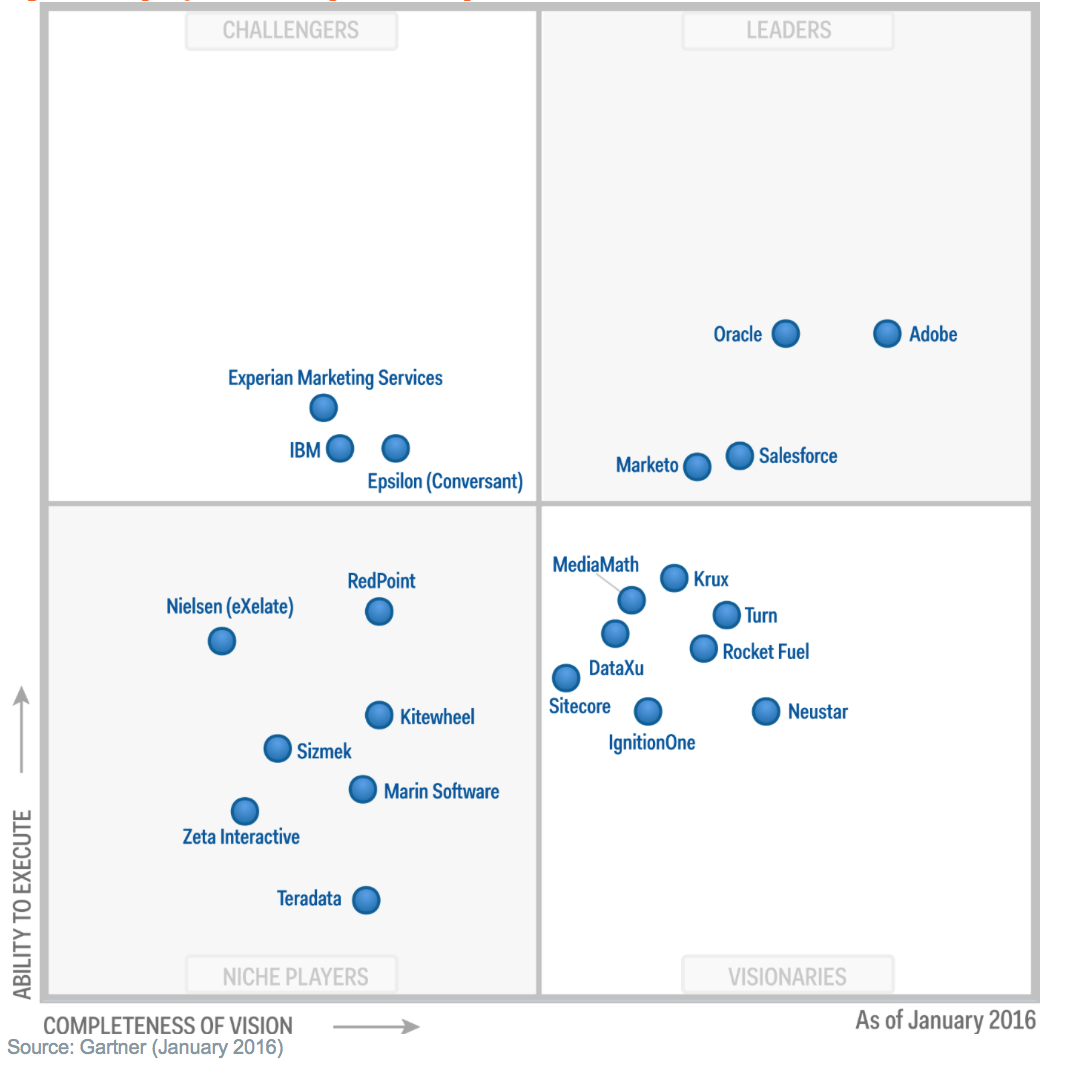Why Comparing Apples, Oranges & Potatoes is a Good Thing – For Now
by Rebecca Muir on 16th Feb 2016 in News

Last month, Gartner released the second Magic Quadrant for Digital Marketing Hubs and named Oracle, Adobe, Marketo and Salesforce as 'Leaders' in the category.
The four titans are joined by, among others, Marin Software, Sizmek, MediaMath and DataXu – companies that have far fewer staff, considerably less turnover and arguably much less sophisticated product suites.
In an effort to understand this seemingly random curation, I spoke to senior executives from Marin Software, Sizmek, DataXu, and MediaMath to understand the changes that have taken place in the online ad industry that have led to this David and Goliath-like Magic Quadrant.
Comparing apples, oranges, and potatoes
Gartner is trying to define a new category and, in doing so, have created a situation where apples are being compared with oranges and potatoes. Gartner is trying to abstract a level up from where the industry is today. They are recognising the collision of ad tech and martech and the movement away from channel-specific channels to omnichannel communication.
Gartner defines 'digital marketing hub' as follows:
"A digital marketing hub provides marketers and applications with standardised access to audience profile data, content, workflow elements, messaging, and common analytic functions for orchestrating and optimising multichannel campaigns, conversations, experiences, and data collection across online and offline channels, both manually and programmatically.
"It typically includes a bundle of native marketing applications and capabilities; but it is extensible through published services with which certified partners can integrate."
Below is the latest Digital Marketing Hub Magic Quadrant.

It doesn't take much to see that Gartner have placed significant importance on data management platform (DMP) functionality, or 'master audience profile' – which sees companies such as DataXu, Krux and Turn do well.
ExchangeWire asked Ed Montes, CRO at DataXu, what he thought about being compared with Oracle, Adobe, Salesforce, and Marketo. He said: "I like being in their company – those are very successful, well-respected brands from the tech and marketing side. Being compared to them in terms of product resources and services is great.
"The hard part of the analysis is that we never attempted to integrate or ingest email or search. So, it’s a lens that is useful for someone who is making buying decisions, if they want a total-market solution, because it forces only a few potential winners, but it diminishes the best of breed in any given category. I don’t think it recognises that enough."
Mike Lamb, president at MediaMath said: "Because of how this is defined, there are relatively few companies who have owned and operated capabilities in all pillars. Most have come via acquisition. The Leader quadrant [Oracle, Salesforce, Marketo, and Adobe] represents a counting exercise – those who have bought it all. It is hard if you are not one of those multimillion [dollar] companies to assemble all those capabilities, so [in the remaining quadrants] you’re looking at which companies create the most business impact for their clients."
Ricky Liversidge, CMO, Sizmek said: "The problem that the industry needs to solve is the unification of tech across all customer touch points. Many companies in the leader category are focused on the collection of data rather than the activation of data within the advertising world, especially within the creative landscape."
The proof is in the pudding
If the early iterations of this Magic Quadrant are defining and counting features, then it stands to reason that over the next year there will be some consolidation; but not necessarily through M&A activity.
"Performance marketing is no longer dominated by a single channel", said John McNulty, VP global marketing, Marin Software.
Marketers want integrated execution and data management. They want integrated audience profiling and media orchestration. Marketers do not want a vague influence on execution of messaging, they need to be in total control of what message is going out, and to whom.
This could be achieved through Oracle, Salesforce, Adobe, or Marketo acquiring Sizmek, Marin Software, MediaMath, Krux, or DataXu or (and perhaps more likely) it could be achieved through marketers' actions.
Jon Suarez-Davis, chief marketing and strategy officer at Krux told ExchangeWire: "Krux currently has several client engagements where marketers have selected it to play the role of that brain sending instructions to other vendor’s execution systems, including those of Oracle and Adobe, demonstrating the potential ‘virtual’ nature of the marketing hub."
What does the future look like for today's Digital Marketing Hubs?
We asked each of the companies we spoke to where they would like to see themselves in next year's Digital Marketing Hub Magic Quadrant. Here's what they said:
Jon Suarez-Davis, chief marketing and strategy officer, Krux: "We are confident that we will land in the Leader category in next year’s report, as we continue to penetrate the market, extend our platform, and grow our partner ecosystem."
Ricky Liversidge, CMO, Sizmek said: "We certainly see ourselves moving further to the right and by next year aim to be positioned firmly in the leader category."
John McNulty, VP global marketing, Marin Software said: "Our vision and direction are bold and beyond what most of the companies listed as Visionaries are pursuing. We expect to be included in that quadrant in the near future."
Mike Lamb, president, MediaMath: "We’re not happy being anything other than a leader."
DataXu were not explicit in where they would like to see themselves, but did express a wish to move "up and to the right."
Finally, it will be interesting to see if Google and Facebook join the Digital Marketing Hub Magic Quadrant. Certainly both have the necessary standardised access to audience profile data, workflow, messaging and analytic functions, and cross-channel data collection. But is it the integration with other platforms that will hold them back?
Click here to read more about the Magic Quadrant for Digital Marketing Hubs.








Follow ExchangeWire